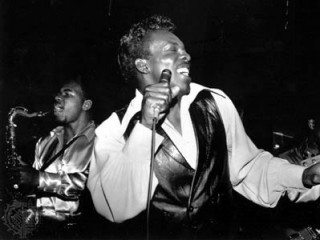
Wilson Pickett biography
Date of birth : 1941-03-18
Date of death : 2006-01-19
Birthplace : Prattville, Alabama, United States
Nationality : American
Category : Arts and Entertainment
Last modified : 2011-09-09
Credited as : R&B/Soul singer, songwriter,
0 votes so far
Born in 1941 in Prattville, Alabama, Pickett had ten older siblings. His childhood was not happy. His mother, Lena, beat him regularly which compelled him to run away from home several times. Pickett began his musical career performing in Baptist church choirs. When he was 14 years old, he moved to Detroit where his father lived. There, Pickett performed on street corners with other singers. In the 1950s, Pickett put together the Violinaires, a gospel group.
A move to a new band and different musical genres led to success for Pickett. He embraced the evolution of gospel into soul/R&B in part because he saw the greater potential for financial success. In 1959, Pickett was asked to join the Falcons. This R&B group already had a hit single with "You're So Fine," before Pickett joined. They had another successful single, "I Found Love" written by Pickett, in 1962.
Pickett soon left the group to strike out as a solo artist. He had some success with a song he co-wrote, "If You Need Me," in 1963. Another version of the song was recorded and released by Solomon Burke around the same time. While Burke found more success with his version, Pickett's take on the song attracted attention as well. The success of "If You Need Me" and several other minor hits led to Pickett signing with Atlantic Records in 1964. His years with Atlantic proved to be the most fruitful of his career. In the mid- to late 1960s, he had a string of hit singles including "Mustang Sally," "634-5789," "Everybody Needs Somebody to Love," "Funky Broadway," and "Land of 1,000 Dances." Pickett was most identified with "In the Midnight Hour," which he co-wrote with Steve Cropper.
"In the Midnight Hour" and many of these other songs were recorded in 1965 during Pickett's sessions at Stax Records produced by legendary producer Jerry Wexler and supported by Booker T. & the MGs, Stax's house band. Of Pickett's powerful vocals, Wexler told Geoff Boucher of the Los Angeles Times upon Pickett's death, "There was something about those records and Wilson's voice those were some of the funkiest, deepest-grooving, in-the-pocket recordings I ever heard. The thing about Wilson was he was just a great screamer but he did it with control."
While Pickett's talent was undeniable, some of his friends and others believed that his prickly, distant, and sometimes explosive personality limited his success and public acclaim when compared with other soul singers from the same time period such as Otis Redding, Sam Cooke, and Al Green. Despite his personal problems, Pickett's recordings were surpassed by his legendary live shows. Live, he combined his gospel background with funk-like stylings such as added shouts, grunts, and screams to each song, much like James Brown. His live performances had a instinctual, animal-like quality to them.
By the late 1960s and early 1970s, Pickett began experimenting with covers of other artists' songs. In 1969, he covered the Beatles' "Hey Jude," with Duane Allman playing guitar. In the 1970s, Picket recorded his versions of songs like the Archies' "Sugar, Sugar" and Randy Newman's "Momma Told Me Not To Come." He continued to record originals as well like the 1970 hit "Engine Number 9."
Pickett's career began to decline as he lacked chart hits after 1973. By the time disco took hold in the 1970s and popular music continued to change in the 1980s, Pickett's star faded, though he continued to tour and record on occasion. He also became more unstable in his personal life and developed a drinking
problem. In 1974, he was arrested for brandishing a gun during an argument in New York. Thirteen years later, Pickett was arrested and sentenced to probation for possession of a loaded shotgun in his car.
The 1990s saw a revival in Pickett's career. In 1991, he was inducted into the Rock and Roll Hall of Fame. More attention was brought to his importance as an artist when the 1991 hit film The Commitments was released. The film focused on a young Irish band obsessed with American soul music and a desire to meet Pickett himself. Though Pickett performed at the New York and Los Angeles premieres of The Commitments , he did not appear in the film.
While his career was revived, Pickett had a series of run-ins with the law. While living in Englewood, New Jersey, in 1991, he drove his car onto the mayor's lawn, spewed death threats, and was arrested. Pickett was convicted of drunk driving in 1993. The conviction resulted in a sentence of a year in jail and five years probation. During his time in jail, he got into a fight with another inmate and injured his eye. Pickett had to have a number of surgeries to fix the damage. Pickett was also arrested for cocaine possession several times and went to rehab.
In 1999, Pickett moved to Ashubrn, Virginia, and recorded his first album in more than a decade. It's Harder Now was nominated for a Grammy Award for traditional rhythm and blues vocal performance as well as three W.C. Handy Awards, given by the Blues Foundation, in 2000. He continued to tour until the end of 2004, when he decided to take a year off from performing. He planned on recording and touring again, but his health began to decline. Wilson died at the age of 64 on January 19, 2006, in Reston, Virginia, after suffering a heart attack. He is survived by his sons, Lynderrick and Michael, and his daughters, Veda and Saphan.
















